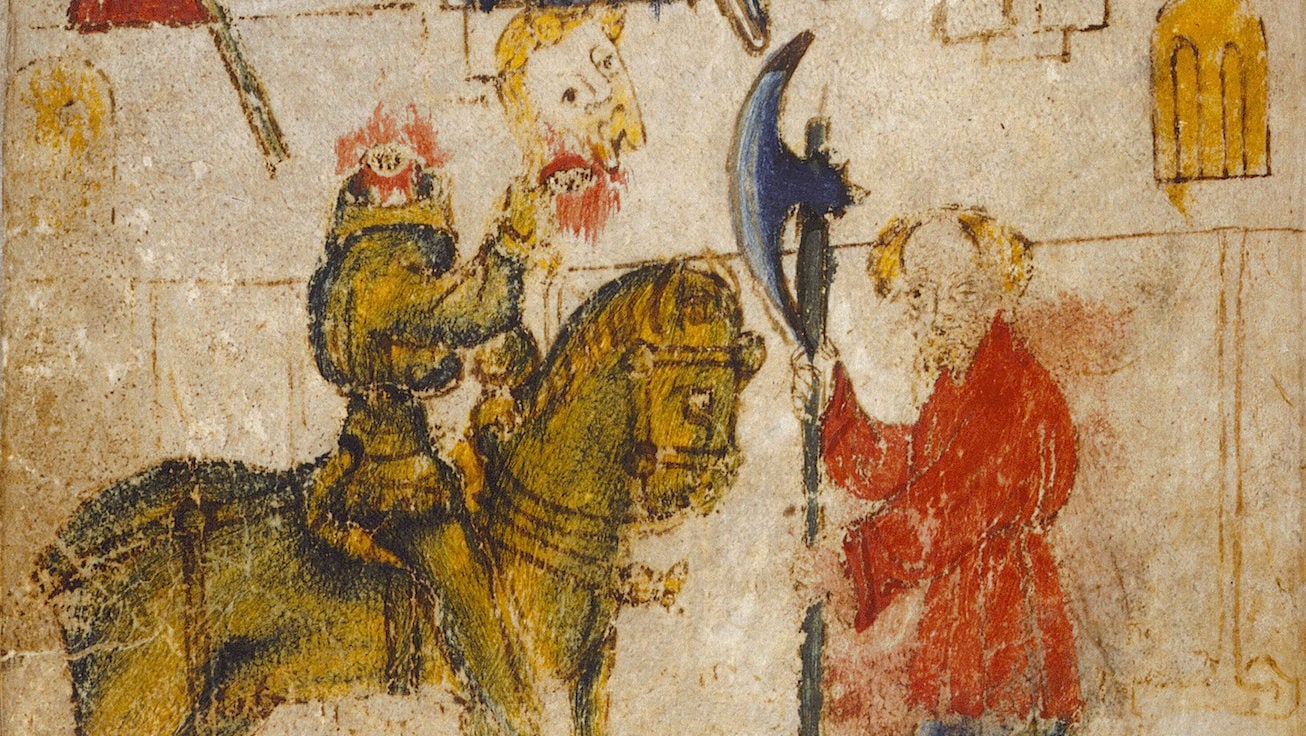This Michaelmas, in the first of his final year of lectures as Professor of Poetry, Simon Armitage chose to revisit his 2007 translation of Sir Gawain and the Green Knight, of which a revised, illustrated version has just been released.
A medieval text which lay dormant in an undiscovered manuscript until the mid-nineteenth century, Gawain has found new life in translations, of which, as Armitage admits in his original introduction, there exist “dozens, possibly hundreds” – some of them scholarly, some in verse, some in prose, many of them amateur and posted on the Internet.
Armitage’s own celebrated translation is unusual in its attempt to convey the original poem’s alliterative metre and four-stress lines in modern English. Armitage, like the Gawain-poet, is a Northerner and thus shares an affinity with the original poem’s distinctive dialect. Despite this, he is an unapologetic defender of modern translation, which as he says, opens up what would be a poem of minority interest to a much wider audience. This translation preserves the entertaining narrative and timeless questions about moral codes, as well as our relationship with the natural world.
With a poem like Gawain, whose difficult, winding language makes contemporaries like Chaucer seem easy-going in comparison, translation makes sense as an aid even to scholarly readers. But Armitage’s defence of translation reflects its continued low status – it seems a widely-held belief by those in the know that literature is always better in the original, a belief which seemingly discourages many from ever reading foreign language texts – by recent estimates, translations only account for 2% of books sold in the United Kingdom.
Having studied English and modern languages and read texts in the original and in translation, it is hard to say which has more value. The realities of a languages degree are such that is often hard to read a text entirely in the original in time for a class or a tutorial, and English translations quickly present themselves as a time-saving option, their unimpeded reading, I have found, often resulting in a better sense of the essence of a text.
To read in the original language is to get a stronger sense of the language spoken by the author and in which their ideas were formulated, but the frustration of trying to keep in mind, say, the many clauses and sub-clauses of a 600 word Proust sentence, before finding you have to look up a word in the middle, inevitably leads to a more frustrated sense of these ideas. As imperfect readers, our individual frames of reference are such that we only gather some of what is being said – familiarity with the original language of a text, although important, is only one of these frames of reference.
Translation is not without flaws – it cannot help but alter authorial voice, although the degree to which this takes place is certainly not consistent. Indeed, Armitage’s translation, with its clear sense of his own voice, often reads like a retelling, and might more accurately be described as adaptation (though the line between the two is certainly vague). While sometimes modern English allows him able to stay close to the original – ‘his vesture uerayly watȝ clene verdure’ becomes ‘In all vestments he revealed himself veritably verdant!’ – his decision to stick with alliteration often results in a slightly different meaning. In the translation of a line like ‘syþen waked me wyþ’ into ‘yet you joined in my revelling right royally every night’, Armitage’s modern alliteration, a technique now more associated with nursery rhyme than romance, imbues the translation with a comic delight in the quaintness of medieval life that is not in the original.
Similarly, it is a reflection of the slow death of regional dialects in the United Kingdom that Armitage’s broadly Northern tongue only approximates the original poet’s more localised Staffordshire-Cheshire dialect. Although Armitage could not be accused of obscuring Gawain’s Northernness, translation clearly does have negative potential, not helped by the fact that translators into English are more often than not native-English speakers, who, in translating the literature of countries that might have been former colonies, might have an inclination to obscure the political or cultural ‘Other’. Clearly, in reading in translation, it is just as important to have a sense of the translator and their intentions as it is of those of the author.
Ironically, medieval attitudes to authorship and transmission were far more relaxed than our own, and there was the expectation that texts would change via the hands of different scribes. The Gawain manuscript, for example, is widely accepted not to be in the hand of the author, and the text itself is the product of mutual exchange between languages and cultures through translation – the French romances which English Arthurian tradition drew on postulated themselves as re-imaginings of Ancient British oral traditions.
The sense of an individual authorial voice is evidently more important for modern readers: the value we accord to a translation comes down to how important we view the pure preservation of this is, in relation to the other things we gain from the literature of the past and of other languages. Whether these are universal themes, or an understanding of the individuals and periods that produced it, Armitage’s Gawain seems to find a balance.



